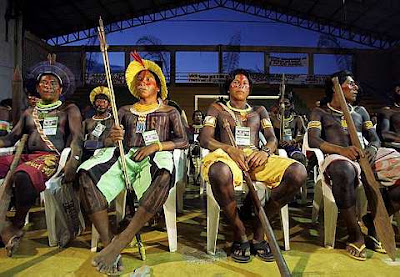
Brazilian Indians attend a protest against the construction of the Belo Monte hydropower dam in Altamira, Brazil, Monday, May 19, 2008. Indians gather in Altamira this week to devise a strategy for fighting the proposed US$6.7 billion dam. Belo Monte, schedule to go out to bid next year, would produce 6.3 percent of Brazil's electricity by 2014, feeding the northwest coast, the southeast industrial base and the jungle free-trade zone of Manaus.

An indigenous woman, holding a child, attends a protest against the construction of the Belo Monte hydropower dam in Altamira, Brazil, Monday, May 19, 2008. Brazilian Indians gather in Altamira this week to devise a strategy for fighting the proposed US$6.7 billion dam. Belo Monte, schedule to go out to bid next year, would produce 6.3 percent of Brazil's electricity by 2014, feeding the northwest coast, the southeast industrial base and the jungle free-trade zone of Manaus.

Brazilian Indians protest against the construction of the Belo Monte hydropower dam in Altamira, Brazil, Monday, May 19, 2008. Indians gather in Altamira this week to devise a strategy for fighting the proposed US$6.7 billion dam. Belo Monte, schedule to go out to bid next year, would produce 6.3 percent of Brazil's electricity by 2014, feeding the northwest coast, the southeast industrial base and the jungle free-trade zone of Manaus.

Brazilian Indians protest against the construction of the Belo Monte hydropower dam in Altamira, Brazil, Monday, May 19, 2008. Indians gather in Altamira this week to devise a strategy for fighting the proposed US$6.7 billion dam. Belo Monte, schedule to go out to bid next year, would produce 6.3 percent of Brazil's electricity by 2014, feeding the northwest coast, the southeast industrial base and the jungle free-trade zone of Manaus.




1)






